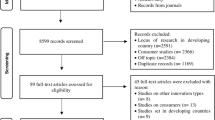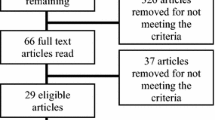Abstract
Governments and international organizations are increasingly determined to create more sustainable food value chains (SFVCs). However, only little empirical evidence is available on how SFVCs are understood. Enquiring African food value chain actors allows gathering valuable insights into their perception of sustainability, which characteristics of sustainable food value chains they prioritize, and which obstacles to a sustainable transformation they identify. By means of a Q-methodology involving interviews with 33 Kenyan respondents, four perspectives were distinguished. The first perspective, “economic productivity and growth,” prioritizes economic growth and has only limited attention to the social dimension of sustainability. The second perspective, “food security and food availability,” believes that ensuring food security should be the key goal of SFVCs. The third perspective, “environment first,” is dedicated to the environmental dimension of sustainability; the perspective implies that protecting natural resources is the primary way to sustain this level of production. The fourth perspective, “transformative knowledge,” entails that by innovating and sharing knowledge, food value chains can become more sustainable in different areas. Overall, this study provides reliable insights into how Kenyan food value chain actors perceive sustainability in their sector and which elements they believe should be prioritized when rethinking food systems. The study results are valuable for policy-making to further define an SFVC in Kenya and to pave the way for a sustainable transformation of the food sector in developing countries.


Similar content being viewed by others
Data availability
The datasets generated during and/or analyzed during the current study are not publicly available due to privacy restrictions but can be made available from the corresponding author upon reasonable request.
Notes
The first number between the brackets refers to the statement number and the second to the rank of the statement.
References
AGRA (2016) Africa Agriculture Status Report 2016: Progress towards Agricultural Transformation in Africa. Retrieved from Food and Agriculture Organization of the United Nations: http://www.fao.org/family-farming/detail/en/c/453715/. Accessed 4/03/2022
Ajayi O (2007) User acceptability of sustainable soil fertility technologies: lessons from farmers’ knowledge, attitude and practice in Southern Africa. J Sustain Agric 30:21–40
Amaruzaman S, Leimona B, van Noordwijk M, Lusiana B (2017) Discourses on the performance gap of agriculture in a green economy: a Q-methodology study in Indonesia. Int J Biodivers Sci Ecosyst Serv Manag 13:233–247
Aminpour P, Gray S, Richardson R, Singer A, Castro-Diaz L, Schaefer M et al (2020) Perspectives of scholars on the nature of sustainability: a survey study. Int J Sustain High Educ 21:1–20
Andersson E, Haase D, Anderson P, Cortinovis C, Goodness J, Kendal D et al (2021) What are the traits of a social-ecological system: towards a framework in support of urban sustainability. Urban Sustain 1(14):1–8
Annunziata A, Scarpato D (2014) Factors affecting consumer attitudes towards food products with sustainable attributes. Agric Econ 60:353–363
Anvar M, Venter M (2014) Attitudes and purchase behaviour of green products among generation Y consumers in South Africa. Mediterr J Soc Sci 5:183–194
Avriel-Avnia N, Dick J (2019) Differing perceptions of socio-ecological systems: insights for future transdisciplinary research. Adv Ecol Res 60:153–190
Barry J, Proops J (1999) Seeking sustainability discourses with Q-methodology. Ecol Econ 28:337–345
Bikketi E, Speranza C, Bieri S, Haller T, Wiesmann U (2016) Gendered division of labour and feminisation of responsibilities in Kenya; implications for development interventions. Gend Place Cult 23(10):1432–1449
Braun CL, Bitsch V, Häring AM (2021) Behind the scenes of a learning agri-food value chain: lessons from action research. Agric Hum Values 39(1):119–134
Brown S (1980) Political subjectivity: applications of Q-methodology in political science. Yale University Press, New Haven and London
Byrch C, Kearins K, Milne M, Morgan R (2007) Sustainable “what”? A cognitive approach to understanding sustainable development. Qual Res Account Manag 4(1):26–52
Curry R, Barry J, McClenaghan A (2013) Northern visions? Applying Q methodology to understand stakeholder views on the environmental and resource dimensions of sustainability. J Environ Plan Manag 56:624–649
Derksen DM, Mithöfer D (2022) Thinking sustainably? identifying stakeholders’ positions toward corporate sustainability in floriculture with Q methodology. Appl Econ Perspect Policy 44(4):1762–1787
Eurostat. (2020) Sustainable development in the European Union: monitoring report on progress towards the SDGs in an EU context. European Union, Luxembourg
Everard M (2020) Managing socio-ecological systems: who, what and how much? The case of the Banas river, Rajasthan, India. Curr Opin Environ Sustain 44:16–25
Fabinyi M, Evans L, Foale S (2014) Social-ecological systems, social diversity, and power: insights from anthropology and political ecology. Ecol Soc 19(4):1–12
FAO (2013) Climate-smart agriculture sourcebook. FAO, Rome
FAO (2014) Developing sustainable food value chains – Guiding principles. FAO, Rome
FAO (2016) Developing gender-sensitive value chains. FAO, Rome
FAO (2022a) Sustainable food value chains knowledge platform. Retrieved from FAO. https://www.fao.org/sustainable-food-value-chains/what-is-it/en/. Accessed 21/01/2022a
FAO (2022b) The agriculture sector in Kenya. Retrieved from FAO. https://www.fao.org/kenya/fao-in-kenya/kenya-at-a-glance/en/. Accessed 14/02/2022b
Fifka M, Kühn A-L, Adaui CR, Stiglbauer M (2016) Promoting development in weak institutional environments: the understanding and transmission of sustainability by NGOS in Latin America. VOLUNTAS Int J Voluntary Nonprofit Organ 27:1091–1122
Gannon KE, Pettinotti L, Conway D, Surminski S, Ndilanha E, Nyumba T (2022) Delivering the sustainable development goals through development corridors in East Africa: a Q-methodology approach to imagining development futures. Environ Sci Policy 129:56–67
Glasson GE, Mhango N, Phiri A, Lanier M (2010) Sustainability Science Education in Africa: negotiating indigenous ways of living with nature in the third space. Int J Sci Educ 32:125–141
Godde C, Mason-D’Croz D, Mayberry D, Thornton P, Herrero M (2021) Impacts of climate change on the livestock food supply chain; a review of the evidence. Glob Food Sec 28:1–17
Gòmez M, Barrett C, Buck L, De Groote H, Ferris S, Gao H et al (2011) Research principles for developing country food value chains. Science 332:1154–1155
Goswami R, Saha S, Dasgupta P (2017) Sustainability assessment of smallholder farms in developing countries. Agroecol Sustain Food Syst 41:546–569
Hermans F, Kok K, Beers P, Veldkamp T (2012) Assessing sustainability perspectives in rural innovation projects using Q-methodology. Sociol Rural 52:70–91
Holdsworth M, Landais E (2019) Urban food environments in Africa: implications for policy and research. Proc Nutr Soc 78:513–525
IFAD (2023). The EU and IFAD join forces to support resilient and sustainable food systems. Retrieved from IFAD: https://www.ifad.org/en/web/latest/-/the-eu-and-ifadjoin-forces-to-support-resilient-and-sustainable-food-systems. Accessed 27 Aug 2023
Kamrath C, Wesana J, Bröring S, De Steur H (2019) What do we know about chain actors’ evaluation of new food technologies? A systematic review of consumer and farmer studies. Compr Rev Food Sci Food Saf 18(3):798–816
Liverpool-Tasie LS, Pummel H, Tambo JA, Olabisi LS, Osuntade O (2020) Perceptions and exposure to climate events along agricultural value chains: evidence from Nigeria. J Environ Manag 264:110430
Marandure T, Bennett J, Dzama K, Makombe G, Mapiye C (2021) Drivers of low-input farmers’ perceptions of sustainable ruminant farming practices in the Eastern Cape Province, South Africa. Environ Dev Sustain 23:8405–8432
Mazzocchi F (2020) A deeper meaning of sustainability: insights from indigenous knowledge. Anthropocene Rev 7:77–93
Meijer SS, Catacutan D, Ajayi OC, Sileshi GW, Nieuwenhuis M (2015) The role of knowledge, attitudes and perceptions in the uptake of agricultural and agroforestry innovations among smallholder farmers in sub- Saharan Africa. Int J Agric Sustain 13:40–54
Moraine M, Grimaldi J, Murgue C, Duru M, Therond O (2016) Co-design and assessment of cropping systems for developing crop-livestock integration at the territory level. Agric Syst 147:87–97
Omondi S (2018) Urban-Based Agriculture and Poultry Production: The Case of Kisumu and Thika in Kenya. Lund University, Sweden
Owens K, Legere S (2015) What do we say when we talk about sustainability? Analyzing faculty, staff and student definitions of sustainability at one American university. Int J Sustain High Educ 16:367–384
Paloviita A (2010) Consumers’ sustainability perceptions of the supply chain of locally produced food. Sustainability 2:1492–1509
Petit G, Bris GY-L, Trystram G, Lallmahomed A (2017) Sustainability for the actors of a food value chain: how to cooperate? Int J Sustain Dev Plan 12:1370–1382
Redman C, Grove M, Kuby L (2004) Integrating social science into the Long Term Ecological Research (LTER) Network: social dimensions of ecological change and ecological dimensions of social change. Ecosystems 7:161–171
SDG Center for Africa and Sustainable Development Solutions Network (2019) 2019 Africa SDG Index and Dashboards Report. SDG Center for Africa and Sustainable Development Solutions Network, Kigali and New York
Slay C, Dooley K (2020) Improving supply chain resilience to manage climate change risks. Retrieved from The Sustainability Consortium: https://www.sustainabilityconsortium.org/tsc-downloads/35952/. Last accessed 17/12/2021
Stein C, Barron J (2017) Mapping actors along value chains: integrating visual network research and participatory statistics into value chain analysis. International Water Management Institute (IWMI) and CGIAR Research Program on Water, Colombo
Su C-H, Tsai C-H, Chen M-H, Lv WQ (2019) U.S. sustainable food market generation Z consumer segments. Sustainability 11:1–14
Szejda K, Stumpe M, Raal L, Tapscott CE (2021) South African consumer adoption of plant-based and cultivated meat: a segmentation study. Front Sustain Food Syst 5:1–14
The Global Environment Facility (2020) Resilient food systems: programme highlights 2020. GEF Partners
United Nations (2012) Report of the United Nations Conference on Sustainable Development. United Nations, Rio de Janeiro
United Nations (2022) The horn of Africa is facing its worst drought in more than four decades. UN Office for the Coordination of Humanitarian Affairs
Vanhonacker F, Van Loo EJ, Gellynck X, Verbeke W (2013) Flemish consumer attitudes towards more sustainable food choices. Appetite 62:7–16
Villholth KG (2013) Groundwater irrigation for smallholders in Sub-Saharan Africa – a synthesis of current knowledge to guide sustainable outcomes. Water Int 38:369–391
Watts S, Stenner P (2012) Doing Q methodological research: theory, method and interpretation. SAGE, Los Angeles
Whyte P, Lamberton G (2020) Conceptualising sustainability using a cognitive mapping method. Sustainability 12:1–20
Wijaya A, Offermans A (2019) Public agricultural extension workers as boundary workers: identifying sustainability perspectives in agriculture using Q-methodology. J Agric Educ Ext 25:3–24
Willett W, Rockström J, Loken B, Springmann M, Lang T, Vermeulen S et al (2019) Food in the Anthropocene: the EAT–Lancet Commission on healthy diets from sustainable food systems. Lancet 393:447–492
Yang Q, Shen Y, Foster T, Hort J (2020) Measuring consumer emotional response and acceptance to sustainable food products. Food Res Int 131:108992
Author information
Authors and Affiliations
Contributions
Conceptualization: M.F.S. and S.V.P.; methodology: M.F.S., S.V.S., J.C., and S.V.P.; collecting data: M.F.S., S.V.S., D.O.A., M.O., and C.O.; formal analysis: M.F.S.; writing – original draft preparation: M.F.S.; writing – review and editing: S.V.S., S.V.P., and J.C.; visualization: M.F.S.; supervision: J.C. and S.V.P. All authors have read and agreed to the published version of the manuscript. We also would like to thank our Kenyan respondents for their participation in this study.
Corresponding author
Ethics declarations
Competing interests
The authors declare no competing interests.
Supplementary Information
Below is the link to the electronic supplementary material.
Rights and permissions
Springer Nature or its licensor (e.g. a society or other partner) holds exclusive rights to this article under a publishing agreement with the author(s) or other rightsholder(s); author self-archiving of the accepted manuscript version of this article is solely governed by the terms of such publishing agreement and applicable law.
About this article
Cite this article
Finizola e Silva, M., Van Schoubroeck, S., Cools, J. et al. Local actors’ perspectives on sustainable food value chains: evidence from a Q-methodology study in Kenya. J Environ Stud Sci 14, 36–51 (2024). https://doi.org/10.1007/s13412-023-00854-5
Accepted:
Published:
Issue Date:
DOI: https://doi.org/10.1007/s13412-023-00854-5




